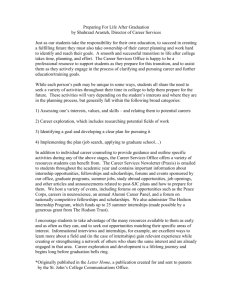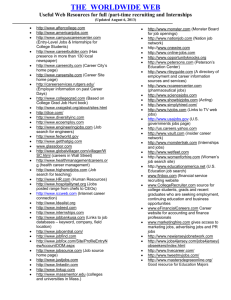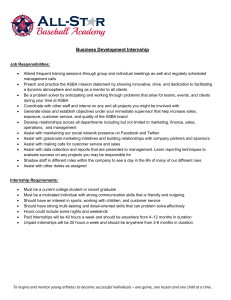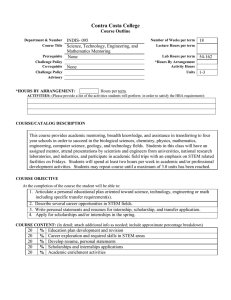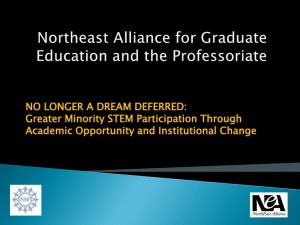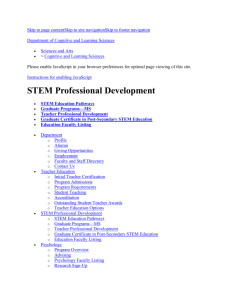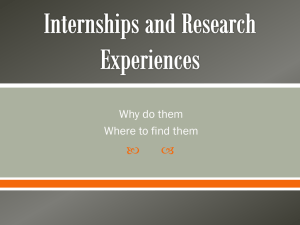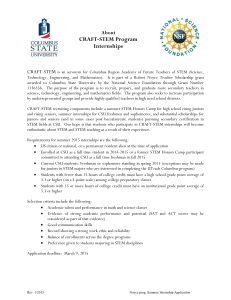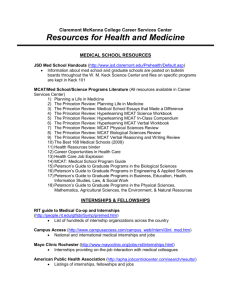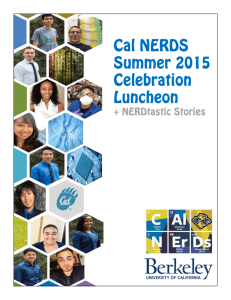Flesner presentation - College of Education
advertisement
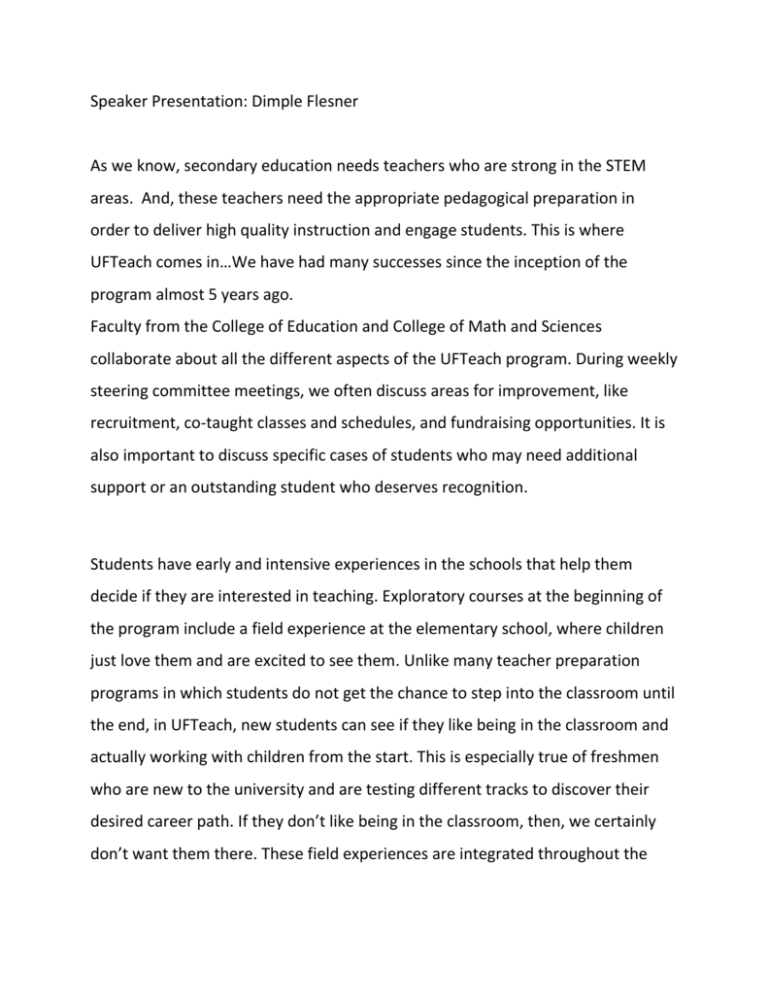
Speaker Presentation: Dimple Flesner As we know, secondary education needs teachers who are strong in the STEM areas. And, these teachers need the appropriate pedagogical preparation in order to deliver high quality instruction and engage students. This is where UFTeach comes in…We have had many successes since the inception of the program almost 5 years ago. Faculty from the College of Education and College of Math and Sciences collaborate about all the different aspects of the UFTeach program. During weekly steering committee meetings, we often discuss areas for improvement, like recruitment, co-taught classes and schedules, and fundraising opportunities. It is also important to discuss specific cases of students who may need additional support or an outstanding student who deserves recognition. Students have early and intensive experiences in the schools that help them decide if they are interested in teaching. Exploratory courses at the beginning of the program include a field experience at the elementary school, where children just love them and are excited to see them. Unlike many teacher preparation programs in which students do not get the chance to step into the classroom until the end, in UFTeach, new students can see if they like being in the classroom and actually working with children from the start. This is especially true of freshmen who are new to the university and are testing different tracks to discover their desired career path. If they don’t like being in the classroom, then, we certainly don’t want them there. These field experiences are integrated throughout the program, beginning at the elementary level, to middle school, and finally, culminating with an internship at the high school level. Research-based certification coursework does not need to be taken while teaching full time. Students can dedicate their time and energy to the courses instead of trying to balance both work and school. The master teachers who teach the UFTeach courses have 20+ years experience teaching in public schools, and these math and science veteran teachers often co-teach the education courses, showing how math and science can be integrated. UFTeach students are an elite group of individuals that have made the choice to pursue mathematics, science and education; they share the passion that compels middle and high school students to learn and grow. This program attracts the best and brightest into teaching and develops teachers with a high level of expertise who can also act as mathematicians or scientists. In fact, our students, as a whole, have a higher GPA than the UF average. Financial support is available for the student, including scholarships and internships, to allay any financial burdens or concerns. This includes scholarships during the senior year when taking the fulltime apprenticeship; these scholarships are based on academic promise, personal accomplishments, teaching ability, and financial need. Scholars commit to teaching in a high-needs school district for at least two years for every year of funding received. In addition, scholars take leadership roles in the program by assisting in recruiting students into the UFTeach minor and working with STEM faculty members on research projects. We also offer internships in informal science settings. These internships raise a new awareness not easily gained in the traditional classroom settings in which teachers typically learn. Internships are important to UFTeach students and to the community. Besides collaboration between the colleges, there is collaboration between the University and the school district. These communications with district personnel and building principals create positive interactions between the public schools and the university, and we are able to attract high quality mentor teachers. This is mutually beneficial because the university gets exemplary teachers and in turn, these teachers receive professional development opportunities and a stipend for hosting our students. Of course, with successes come challenges. Recruiting math and science majors who are usually pre-med to try teaching has proved difficult. They come to the University of Florida with a chosen career path, and it is hard to entice them into the UFTeach program- to a rewarding, yet lower paying job. However, when they do try it, these students often find that they love teaching; they just need to consider it as an option. Some may not enter the teaching profession, but their experience in the minor prepares them for working as teaching assistants in graduate school or teaching later in life. It is difficult to recruit mentor teachers to give up their classrooms, especially in this atmosphere of FCAT testing and annual evaluations based on test scores. Often, teachers are worried about allowing others to take over their students’ learning, but we encourage co-teaching between the mentor and the student teacher, rather than the student leading the class. Coordinating field placements when other programs need high- quality mentors to supervise their students is difficult; there are only so many outstanding teachers to choose from, and we all need to place students in exceptional settings in which they experience the realities of the classroom. Also, matching student and mentor schedules is an added challenge; students have long labs and other classes during the day when math and science teaching is going on in the public school. Creating degree plans and plans of study with all the different math and science departments and majors is difficult because they are already set without the inclusion of the UFTeach minor. Because UFTeach is a large minor, we need to replace classes already in the major in order to guarantee students can graduate within four years. We have been able to have some courses count as general education requirements, and we have been able to make some substitutions. Finding the professors from CLAS to teach UFTeach courses during these difficult financial times and continuing collaboration is another challenge. However, some do see the importance of STEM education and support us in this endeavor. There are many benefits and challenges. However, to see students progress through the program and become teachers who have the content knowledge and a passion for teaching is so exciting and so rewarding. One of our students who decided to pursue a graduate degree in math education before entering the classroom told me that UFTeach showed her how students can learn in an exploratory, motivating and dynamic way. She told me that using all the strategies and suggestions acquired from UFTeach will definitely impact her students’ success. She just wants them to love math as much as she does, and to know they can be good at it. As a UFTeach graduate, this will surely be the case! UFTeach provides countless opportunities for middle and high school students to experience the wonders of mathematics and science. This excellent program is serving growing numbers of STEM students every year. At this time, almost a million students are being served by UTeach graduates, and it is projected that 4 million will be served by 2018. High enrollment and high retention in the field—in fact, UFTeach reports 80% teacher retention after 5 years. This is a video about UFTeach put together by one of our graduates. It discusses the program from the student perspective.
